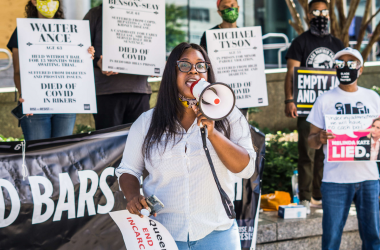Women’s health in prison: urgent need for improvement in gender equity and social justice
By World Health Organization
Brenda J van den Bergh, Alex Gatherera & Lars F M llera
June 29th, 2009
The needs of women held in detention have received little attention and
continue to be neglected by health systems and prison authorities. One
reason for this, too readily accepted until now, is that women prisoners are
a clear minority group within prisons all over the world. It is only
recently that attention has been drawn to the fact that a minority status
does not justify the widespread ignorance of women’s basic rights and the
considerable gender insensitivity still dominating criminal justice systems.
In Europe alone, there are about 100 000 women and girls in prison.[1]
Although representing a small proportion of the prison population, at a
median level of 4.4% in Europe,[2] the female prison population is
increasing, often at a much greater rate than that for male prisoners.[3]
Many women in prison serve a short sentence and are imprisoned for
non-violent, property or drug-related offences.[4] They frequently come from deprived backgrounds and experience problems related to alcohol and drug dependencies, infectious diseases, reproductive diseases and histories of physical and sexual abuse. Alarmingly high rates of mental health problems are reported, such as post-traumatic stress disorder, depression, anxiety and a tendency to self-harm and suicide. For instance in England and Wales, it was noted that 90% of the women prisoners have a diagnosable mental disorder, substance use or both.[5]
In addition, many imprisoned women are mothers and are usually the primary or sole carer for their children.[4] When a mother is imprisoned, frequently the father does not continue to care for his children, resulting in large numbers of children being institutionalized. 1 In many countries, very young children can stay with their mother in prison, sometimes in special
facilities like mother and baby units. Both options, allowing children to
live with their mothers in prison and separating them, create difficult
dilemmas. Separation of mother and child can cause long-term developmental and emotional harm for the child and can affect the mother’s physical and mental health, while at the same time the prison environment is a far from ideal environment for a child to be raised. It is rare that decisions are clearly made in the best interests of the child.
Recognizing that the public health importance of prison health was being
neglected, the WHO Regional Office for Europe established in 1995 the Health in Prisons Project (HIPP).[6] This continuously expanding network of 38 Member States in Europe is committed to reducing the public health hazards associated with prisons along with protecting and promoting health in prisons. Published reports of the HIPP during recent years, including the widely used WHO guide to the essentials in prison health[5] in 2007 and the Trenèin Statement on Prisons and Mental Health[7] in 2008, have combined the latest research and analysis from experts throughout the world and have clearly raised the profile of prison health issues.
Member States of HIPP have recently drawn attention to the real need for
authoritative guidance on the topic of women’s health in prison. Building on WHO’s gender policy,[8] the Regional Office in 2008 reviewed recent research and collaborated with the United Nations Office on Drugs and Crime (UNODC) and the Quaker offices in Geneva and Brussels to develop evidence-based guidance on the major aspects of women’s health in prisons and, indeed, the criminal justice system as a whole. This work has been recorded in a background paper which is included with a joint WHO/UNODC Declaration (Kyiv Declaration) on Women’s health in prison,[9] published in April 2009.
Although there are major differences in the methods that countries use to
address the special needs of women in their criminal justice system, the
evidence is clear and consistent. Current arrangements for dealing with
women offenders fail to meet their basic needs and are far short of what is
required by human rights, by accepted international recommendations and by social justice. Health is after all a fundamental human right, for women in detention as well as for those in the community.
Yet, if prisons are made into settings in which useful protection and
promotion work can occur, much can be achieved in the time period that women are under the responsibility of national prison services. Prisons can
provide disease prevention and educational programmes as well as offer
treatment focusing on mental health and substance use problems, and can be used to provide help to this group of women who are among the most
disadvantaged and hard to reach people in any society.
The necessary changes will require political awareness and support,
considerable gender-sensitivity training of all staff and policy-makers
working in the criminal justice system and a real commitment to equity and social justice.
References
UNODC handbook for prison managers and policymakers on women and
imprisonment. Vienna: United Nations Office on Drugs and Crime; 2008.
Walmsley R. World female imprisonment list. London: International Centre for
Prison Studies; 2006.
Bastick M, Townhead L. Women in prison: a commentary on the UN standard minimum rules for the treatment of prisoners. Geneva: Quaker United Nations Office; 2008.
Women in prison: a review of the conditions in Member States of the Council of Europe. Brussels: Quaker Council for European Affairs; 2007.
Health in prisons. a WHO guide to the essentials in prison health.
Copenhagen: World Health Organization Regional Office for Europe; 2007.
Health in Prisons Project [home page]. Copenhagen: World Health Organization Regional Office for Europe. Available from: http://www.euro. who.int/prisons
[accessed on 4 May 2009].
Trencin statement on prisons and mental health. Copenhagen: World Health Organization Regional Office for Europe; 2008.
WHO gender policy. Geneva: World Health Organization. Available from:
http://www.who. int/gender/ documents/ policy/en/ [accessed on 4 May 2009].
Declaration on women’s health in prison correcting gender inequity in prison health. Copenhagen & Vienna: World Health Organization Regional Office for Europe & United Nations Office on Drugs and Crime; 2009.
Buy Resistance Behind Bars:
Buy Don’t Leave Your Friends Behind:




